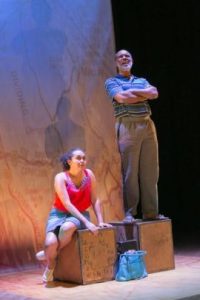Which Way Home
 |
| Photograph by Steven Rhall |
Belvoir present an ILBIJERRI Theatre Company production is association with Sydney Festival, WHICH WAY HOME, by Katie Beckett, in the Downstairs Theatre, Belvoir St Theatre, Surry Hills, 11-29 January.
WHICH WAY HOME, is a play by Katie Beckett. It is a kind of ‘love letter’ to her father. She wanted, she writes in the program notes to the production, ‘to give him something so he knows how special he is and what he means to me.’
Set in a car on a road journey back to her father’s country a Daughter and a Father remember, reflect and observe each other. She is a disciplined timetabled (maybe, more than slightly uptight) escort to her father, who is a kind of loveable rogue, appearing at first in a black wig to disguise his age and to look ‘deadly’ for the women whose path he might cross and among other things, drops rubbish in the landscape without a thought of propriety – the daughter cleaning up after him without a word of criticism. He is no saint. And she with the eyes of a blind cupid loves and protects him as the sands of time fall out symbolically in the far corner of the stage.
The writing is naive and fairly juvenile in its plotting and character revelations. It is a first play, indeed, even despite the past several years of development and Dramaturgical advice of Jane Bodie (who, similarly, has written a play, THIS YEAR’S ASHES, as a memorial to her own father). WHICH WAY HOME has more sentimental impact than inspirational revelation. In fact, on the opening night the most genuine moments were in the curtain call when Ms Beckett’s father was invited to take a bow. He did and ‘jived’ to the music of the production’s curtain call. The audience responded warmly and it simply seemed to encourage him to keep on dancing – the actual ‘loveable rogue’ impersonated in the play, danced in front of us, and no one could stop him – the actor’s stood behind, nonplussed, and smiling. The sentiment of the moment, however, brought tears to some eyes.
Ms Beckett played the Daughter with a ‘pretended’ showing of most of the character’s journey. It was only in the final moments of the play that she relaxed into a real and truthful response to what she, as the writer, had written. Tony Briggs, a performer of somewhat more experience and access to the roguish personable charm of the Father figure provided an anchor for the evening’s telling. His ease and alert ear to the audience’s response kept the production moving forward, with a relative, in-the-moment sophistication.
Rachel Maza, as Director, has invited Emily Barrie to Design Set and Costume, with Niklas Pajanti providing the Lighting for a very simple visual conceit. There is an unsophisticated hand at work with this Direction and some of the problems of the performance have to do, perhaps, with Ms Maza’s apparent deep identification and ownership of the work with her company. It lacks objective discipline to develop the necessary forward energy of storytelling, and sometimes, rather, demonstrates the emotional life of the inspiration of the work. It lacks the coolness of judged economy.
The interesting experience with WHICH WAY HOME, for me, was to sit in an audience with a large number of indigenous audience and friends and hear the ready and warm response to the material. I reflected it was a pleasure and a surprise for a lot in this audience who were seeing something of their own life experiences and stories been told on stage – the play, despite the naivety and juvenile workmanship of the playwright, is a collection of special moments for them. Similarly, the experience that I had with BATTLE OF WATERLOO, with an indigenous audience, reflected the joy of the recognition of that audience to their world being honestly revealed in the theatre – that play, by-the-way, being of a much more sophisticated mien, than this one.
Is this what I recall was my excitement to the 1970’s playwriting of my generational culture – seeing my life on stage for the first time? a joyful recognition. Perhaps it was. Because re-reading some of those plays that I have such a strong memory of, reveals their playwriting naivety. And, certainly, mine, too.
This production is for a special audience who can look beyond the efforts of a first time playwright expressing a grateful loyalty to her father, and simply enjoy the human sentiment behind its need to be told, created.
ILBIJERRI is Australia’s leading and longest running Aboriginal and Torres Strait Islander theatre company. It is based in Melbourne and Rachel Maza is its Artistic Director.